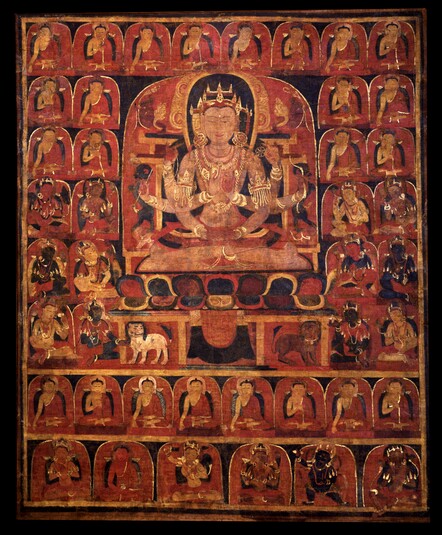
Item: Vairochana Buddha - Vajradhatu (Tattvasamgraha Tantra)
| Origin Location | Western Tibet |
|---|---|
| Date Range | 1200 - 1299 |
| Lineages | Kadam |
| Material | Ground Mineral Pigment on Cotton |
| Collection | Carolyn and Wesley Halpert |
Classification: Deity
Vajradhatu Vairochana (Tibetan: dor je ying, nam par nang dze): the central figure from the 53-deity mandala; Yoga class of Tantra.
Peaceful in appearance, white of colour, he has four faces, white, yellow, green and red. With eight hands the first pair perform a mudra (gesture) at the heart, the second perform the mudra of meditation in the lap. The remaining two right hands hold a mala (prayer beads) and an arrow. The left two hold a Dharma wheel and a bow. Adorned with a crown of gold and jewels, round earrings studded with gems, necklaces, bracelets and anklets, the lower body is wrapped with a skirt of various colours. The legs are folded in vajra posture with the right over left atop a moon disc and multi-coloured lotus seat placed above a lion supported throne further decorated with an elaborate backrest (Sanskrit: torana).
Along the top and upper sides are 16 buddha figures, identical in appearance, with one face and two hands, red robes, the right arm bare and seated in vajra posture. They each perform their own unique mudras (hand gestures). At the right and left sides of the central figure are two groups of six bodhisattvas, well adorned with jewels and silks, performing mudras and seated in relaxed casual postures.
At the bottom from left to right is the Mother of all Conquerors - Prajnaparamita, Buddha Amitayus, Arapachana Manjushri, Shadaksari Avalokiteshvara, Guhyapati Vajrapani and Syama (green) Tara.
Jeff Watt 4-2000
Publication: Leaves from the Bodhi Tree
Thematic Sets
Collection of Caroline & Wesley Halpert
Painting Style: Western Tibetan
Subject: Yoga Tantra
Buddhist Deity: Vajradhatu
Buddhist Deity: Vairochana (Tattvasamgraha Tantra)
Buddhist Deity: Vairochana, Trailokyavijaya (Tattvasamgraha Tantra)
Painting Style: Indian (11th to 13th century)
Buddhist Subject: Tattvasamgraha Tantra
Subject: Yoga Tantra Main Page
